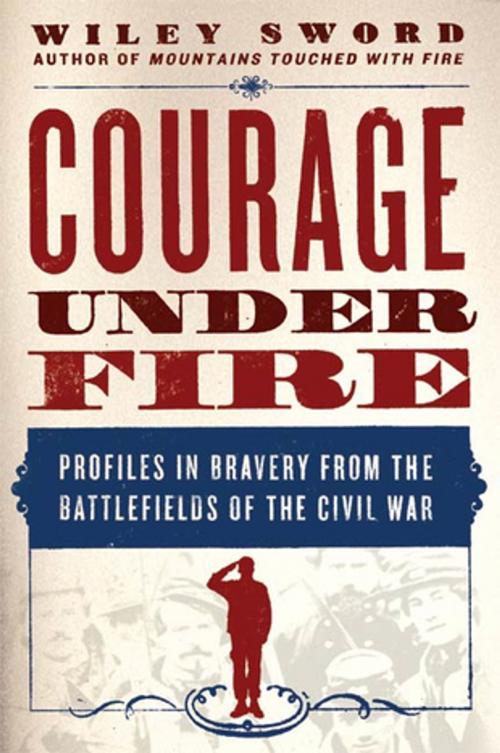Courage Under Fire
Profiles in Bravery from the Battlefields of the Civil War
Nonfiction, History, Americas, United States, Civil War Period (1850-1877)| Author: | Wiley Sword | ISBN: | 9781429994330 |
| Publisher: | St. Martin's Press | Publication: | March 29, 2011 |
| Imprint: | St. Martin's Press | Language: | English |
| Author: | Wiley Sword |
| ISBN: | 9781429994330 |
| Publisher: | St. Martin's Press |
| Publication: | March 29, 2011 |
| Imprint: | St. Martin's Press |
| Language: | English |
"If it is necessary that I should fall on the battlefield for . . . my courage does not halt or falter" – Major Sullivan Ballou, 1861, prior to the Battle of Bull Run
In Courage Under Fire, award-winning historian Wiley Sword captures the fervor of a nation at war with itself; a war that pitted brother against brother. Through the immediacy of diaries and letters written not only on the battlefields and in camps but also on the deathbeds of soldiers from both the North and South, Sword lays bare the complexities and depth of a soldier's mind in coming to grips with life and death – even while his country, and often his family, is mercilessly ripped apart.
From wives and mothers to the highest military figures, all strived toward often worthy but difficult objectives, while seeking to suffer as little as possible. Featured in this compelling study of men and women facing the severest stress of their lives are fascinating stories such as that of Union Lieutenant Colonel Frank Curtiss. He was ordered to take his regiment, the 127th Illinois, in a hopeless charge against the enemy's fortified lines at Atlanta, Ga. on August 3, 1864. Aware that many of his men would die needlessly and for minimal tactical gain, he refused to obey these orders. The moral courage to fight meant also to appropriately assess the risks and weigh the loss in lives of one's soldiers. Confederate General John Bell Hood's decision to sacrifice much of his army at Franklin, Tennessee on November 30th 1864, ranks as one of the saddest events of the war. His aggressive behavior is assessed in terms of both moral and physical courage, providing a revealing insight into the character of one of the war's key commanders. The prospect of death in battle was a fearsome prospect for Lucy Morse, who kept desperate hope her husband, William H. Morse, would survive the fighting. She wrote to him,"I was almost crazy before I heard from you for fear that you had shared the fate of many a brave soldier." Her story and that of the fateful events in their lives provides graphic evidence of the fiber of America's soldiers and their worthy families.
In a revealing portrait of courage and its often bloody consequences, Wiley Sword conveys a vivid picture of bravery under extreme stress, which is fully appropriate in today's world.
"If it is necessary that I should fall on the battlefield for . . . my courage does not halt or falter" – Major Sullivan Ballou, 1861, prior to the Battle of Bull Run
In Courage Under Fire, award-winning historian Wiley Sword captures the fervor of a nation at war with itself; a war that pitted brother against brother. Through the immediacy of diaries and letters written not only on the battlefields and in camps but also on the deathbeds of soldiers from both the North and South, Sword lays bare the complexities and depth of a soldier's mind in coming to grips with life and death – even while his country, and often his family, is mercilessly ripped apart.
From wives and mothers to the highest military figures, all strived toward often worthy but difficult objectives, while seeking to suffer as little as possible. Featured in this compelling study of men and women facing the severest stress of their lives are fascinating stories such as that of Union Lieutenant Colonel Frank Curtiss. He was ordered to take his regiment, the 127th Illinois, in a hopeless charge against the enemy's fortified lines at Atlanta, Ga. on August 3, 1864. Aware that many of his men would die needlessly and for minimal tactical gain, he refused to obey these orders. The moral courage to fight meant also to appropriately assess the risks and weigh the loss in lives of one's soldiers. Confederate General John Bell Hood's decision to sacrifice much of his army at Franklin, Tennessee on November 30th 1864, ranks as one of the saddest events of the war. His aggressive behavior is assessed in terms of both moral and physical courage, providing a revealing insight into the character of one of the war's key commanders. The prospect of death in battle was a fearsome prospect for Lucy Morse, who kept desperate hope her husband, William H. Morse, would survive the fighting. She wrote to him,"I was almost crazy before I heard from you for fear that you had shared the fate of many a brave soldier." Her story and that of the fateful events in their lives provides graphic evidence of the fiber of America's soldiers and their worthy families.
In a revealing portrait of courage and its often bloody consequences, Wiley Sword conveys a vivid picture of bravery under extreme stress, which is fully appropriate in today's world.















